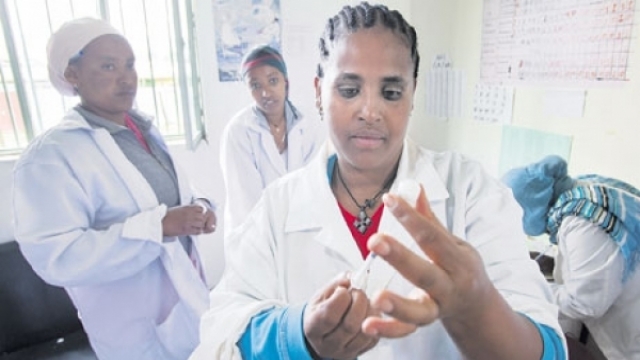 Health extension workers at the Sululta health centre are helping increase the number of babies who receive vaccination against deadly diseases. (Photograph: Petterik Wiggers/Panos)
Health extension workers at the Sululta health centre are helping increase the number of babies who receive vaccination against deadly diseases. (Photograph: Petterik Wiggers/Panos)
By Evelyn Owen
Skilled and respected workers have revolutionised neighbourhood healthcare in Ethiopia – using a model other countries could follow. Evelyn Owen discovers how the programme works and the problems it has confronted
In the hubbub of the vaccination clinic, young mother Damanech Alemu waits patiently with a tiny blue bundle nestled in her arms. Six-week-old Ermias is about to receive the injections that will safeguard him against an array of common diseases, including diphtheria, whooping cough and polio.
“I’m glad to be here, because it means healthy development and a safe life for my son,” Alemu says afterwards, comforting her baby. “I made an appointment, I came here, and I received the service, so I’m happy about that.”
Alemu’s trip to Sululta health centre might sound perfectly ordinary, but less than a quarter of Ethiopian children under the age of two are fully vaccinated. The service offered here, 20 miles north of Addis Ababa, is only possible thanks to the expertise and enthusiasm of the women in white coats bustling about the clinic, preparing needles, checking charts and filling in forms. They are health extension workers (HEWs) – the backbone of Ethiopia’s health system.
Read more at The Guardian.
—
Join the conversation on Twitter and Facebook.

























